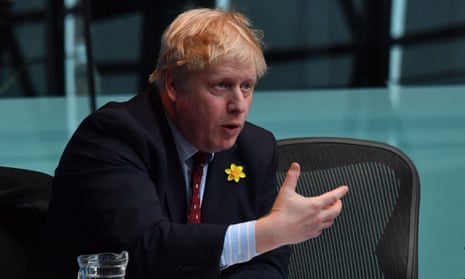Boris Johnson has said that he cannot recall why he signed a key directive as London mayor that contributed to the loss of more than £40m of public money on the city’s garden bridge. Facing increasing pressure over the abandoned project, Johnson, appearing before London Assembly members, answered detailed questions on the scheme for the first time on Thursday.
Johnson offered some contentious reasons as to why the bridge was not built, and alleged that a journalist who had won awards for uncovering problems with the project was motivated by personal dislike of its designer.
The evidence session for the foreign secretary, whose mayoral term ended in May 2016, came a day after a leading lawyer said Johnson could be investigated for misconduct in public office if it is shown political pressure from him contributed to the scale of the garden bridge losses.
The planned tree-filled pedestrian link from Temple to the South Bank was scrapped in August 2017 because of a shortfall in funds raised by the charity behind it and a lack of final planning consent despite three years of talks.
The public liabilities, initially capped at £16m, escalated by 2016 when Transport for London and the Department for Transport agreed to release funding for a construction contract, even though it appeared the stipulated conditions were not in place for this to happen.
Appearing before the London Assembly’s oversight committee, Johnson insisted the funding conditions had been met by the charity behind the project, the Garden Bridge Trust, but was questioned as to why he had made a mayoral direction in April 2016 which watered down some of these conditions.
“If the conditions had been met, why did you need to water it down?” asked Tom Copley, a Labour assembly member.
“The honest answer, Mr Copley, is you asked me something which, I’m afraid, I simply don’t have, at this distance in time,” Johnson answered. “I don’t for a minute accept the characterisation that you’ve made of the, whatever letter I may have signed. I’ll certainly study it and get back to you.”
Earlier, Johnson launched a vehement attack on Will Hurst, a journalist with the Architects’ Journal, who won a British Journalism Award in December for a series of stories uncovering problems with the project, including the flawed process which awarded the design contrast to Thomas Heatherwick, creator of the London Olympic cauldron.
Johnson said media coverage of the garden bridge had included “really quite horrendous” allegations against officials, and claimed – without offering any evidence – that Hurst was motivated by personal dislike of Heatherwick.
“They’ve been connived at in the Architects’ Journal, which has published a stream of abuse of these individuals, which it is motivated to the best of my knowledge by a dislike that the Architects’ Journal journalist concerned had for Thomas Heatherwick, who is not conceived of as being a proper architect, and is therefore somehow worthy of abuse,” he said.
Later in the session Johnson claimed that when the project was cancelled in last August by his successor as mayor, Labour’s Sadiq Khan, the Garden Bridge Trust “had secured every relevant planning permission”.
But in fact the Garden Bridge Trust only secured provisional planning permission from Lambeth council – an agreement that subsequently fell apart because the trust could not reach a deal with Coin Street, a community housing trust who held a vital sublease.
A total of £60m of public money was committed to the project, and £37.4m was spent by the Garden Bridge Trust without any construction work being done, even though a construction contract had been signed.
A report by the Labour MP Margaret Hodge, commissioned by Khan, said the final total in public spending, with cancellation costs, was likely to reach £46.4m.
Johnson insisted that the only reason the losses were incurred was because Khan cancelled the project. Asked if he had any regrets, he replied that the only thing he would have changed was to ensure the bridge was built before he left office. “I think what I might have done in retrospect, the obvious thing is I would have tried to get it going faster, earlier.”
